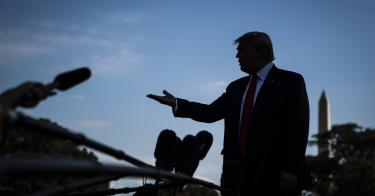Tehran is challenging Trump.
After attacking Saudi oil facilities, the mullahs brazenly denied having anything to do with it and said that President Trump must lift all sanctions against them if he wants them to talk with him.
How will Trump respond? Who knows? Trump says he doesn’t like starting new wars, and notwithstanding his “locked and loaded” comment, there is no sign he is going to unleash the dogs of war anytime soon.
But if the president is going to rein in the regime’s violent, destabilizing behavior and end its nuclear weapons ambitions once and for all, he needs to step up the game.
On Wednesday he ordered the Treasury Department to slap additional sanctions on Iran.
What more — short of war — can Trump do to tame Tehran?
Right now, the administration should concentrate on three main tasks.
Task No. 1: Ratchet up the financial-pressure campaign. The key objective here is to deny Iran hard cash. The regime has major cashflow problems and is really feeling the pinch.
Suffering badly from its economic and political isolation, the regime is now flailing about — railing against the United States, threatening to close the Strait of Hormuz (through which most Middle Eastern oil transits) and risking armed confrontations right and left.
Iran has lost approximately 90% of its oil-export markets. Over the long term, that’s close to a death sentence for the Iranian economy. Make no mistake, the mullahs are acting up out of weakness.
Washington could — and should — crank up the pressure even more. Here’s how.
The Iran deal on nukes negotiated by the Obama administration provides that a party to the agreement can go to the UN Security Council and declare Iran in breach of the agreement. That would trigger a dispute-resolution process that culminates in a vote in the UN Security Council. Unless a majority voted to keep the deal’s sanctions relief in place, the UN sanctions would snap back.
Russia and China could not veto the measure. Iran would suddenly find itself saddled with all the UN sanctions as well as those imposed by Trump.
Sure, America is no longer a party to the Iran deal. But guess who is? The UK, which also happens to be a permanent member of the UN Security Council.
If the US got Britain to take this step, Iran would really be in a bind. After all, Iran itself declared it has violated the Iran deal by accelerating its uranium-enrichment program.
Task No. 2: Keep the strait open. Trump could take a page from the Reagan playbook and offer to have countries reflag their tankers with the Stars and Stripes. Iran would not want to play chicken with the US Navy in the Gulf.
Task No. 3: Support our allies. The Saturday raid was an attack on Saudi Arabia’s sovereign territory; it’s the Saudis’ responsibility to lead the response. We should support them.
That said, a while ago Trump floated the idea of a Middle East Security Architecture, a mutual collective security agreement between the United States and Gulf States. If that idea had taken off, Iran might well have been deterred from daring to attack Saudi Arabia.
Trump might put the idea of collective defense back on the table. Just restarting the discussions would remind the Iranians that the more aggressive they get, the more they tighten the noose around their own neck.
War with Iran is just about the last thing Trump wants. But he’s not going to let them run around the region like berserkers gone wild. Further, Iran knows it isn’t capable of fighting and winning a war with the United States. The mullahs are keenly aware that a major conflict with the West would spell the collapse of their regime.
Right now, the boys in Tehran might profit from a little reminder that times can get a lot worse if they don’t start acting a lot better.
This piece originally appeared in the New York Post




